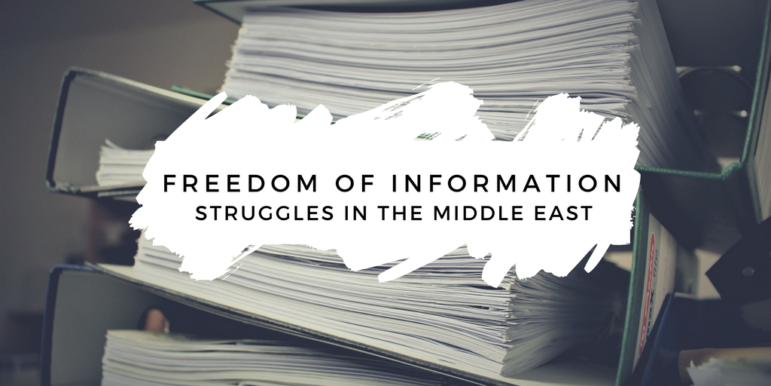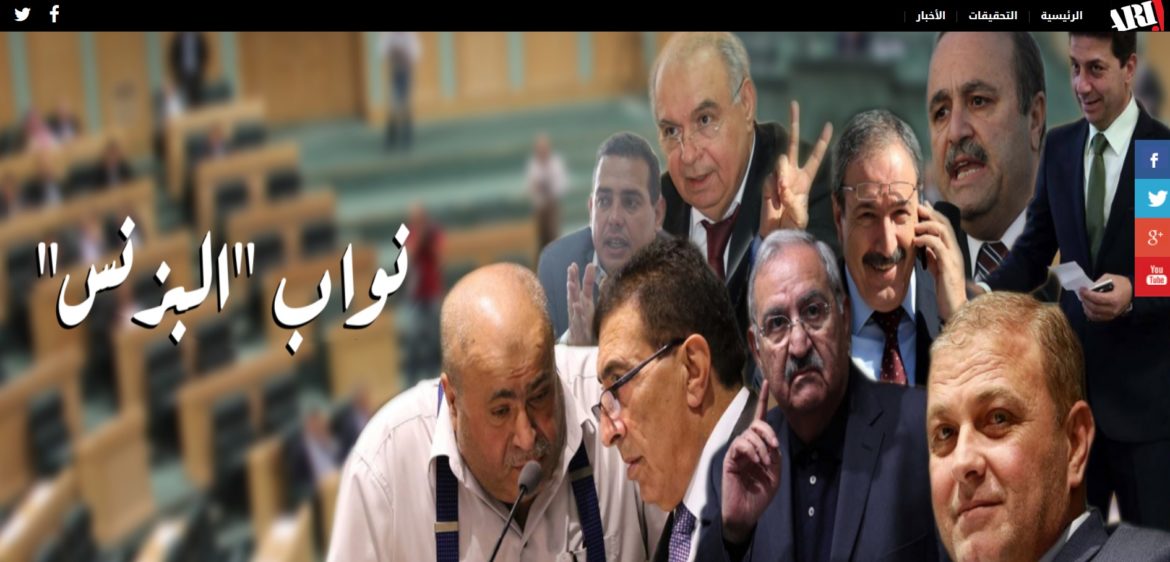

FOI’s Man in the Middle East
Journalists in the Middle East have limited press freedom, and struggle to get even the most basic information out of government departments and officials. But a few countries in the region have recently legislated access to information laws, also known as freedom to information (FOI) laws, including Jordan, Tunisia and Yemen.
In 2007, Jordan was the first Arab country to implement a freedom to information law, although the nation’s press environment is still considered “not free,” according to Freedom House’s Freedom of the Press 2017 report.
Musab Al-Shawabkeh is an award-winning Jordanian investigative reporter based in Amman, who works as an editor and coach for GIJN member Arab Reporters for Investigative Journalism (ARIJ). He is also an FOI veteran who, over the past four years, has filed more than 150 FOI requests as an individual or in his position as director of the investigative journalism unit for Radio Al Balad, a local community station in Jordan.
In his work at ARIJ, Al-Shawabkeh is supervising dozens of investigations in the Middle East and North African region, many of which deal in high level corruption, including money laundering in Libya and how the powerful in Jordan suppress political opponents.
GIJN’s Arabic editor Majdoleen Hassan spoke with Musab Al-Shawabkeh about his work.
How did you start out as an investigative reporter?
My university studies had nothing to do with journalism. I actually studied information technology. I went into journalism because I like it.
 In my undergraduate years, I was on the Students Representative Council, and I used to contribute to my university’s website, writing articles and short reports. After graduation in 2012, I went to “boot camp” training with the International Center for Journalists, and I learned the basics of journalism. Eventually I got a job with Radio Al Balad and Ammannet in Jordan and joined the investigative reporting unit.
In my undergraduate years, I was on the Students Representative Council, and I used to contribute to my university’s website, writing articles and short reports. After graduation in 2012, I went to “boot camp” training with the International Center for Journalists, and I learned the basics of journalism. Eventually I got a job with Radio Al Balad and Ammannet in Jordan and joined the investigative reporting unit.
Tell us about your experience using freedom of information laws as an investigative reporter.
I learned about this through my colleagues who have more experience dealing with FOI, and through courses. Right now, if a journalist in Jordan wants to obtain (government) information, he needs to have a friend or know a person who has access to that information and works for the government.
But journalism, as the fourth estate, should not have to resort to this. So I was trying to find a way in which the journalist could get the information, and I found out about the law. After a while, I received some training on the law and how to use it. This was officially the beginning of my professional career.
What was your first information request?
 I investigated the education system and how it encouraged high school students to cheat on their final exams. I submitted an information request to the Ministry of Education to get statistics about this issue in 2013.
I investigated the education system and how it encouraged high school students to cheat on their final exams. I submitted an information request to the Ministry of Education to get statistics about this issue in 2013.
I specifically wanted to know: “How many students cheated during the final exam according to the ministry statistics?” The request was denied. During this attempt, my colleagues kept telling me that using FOI was useless and it was better to build strong relationships with government employees. However, I insisted on applying FOI due to my faith in this law and its main purpose of making information accessible for Jordanian citizens.
What happened next?
I began submitting requests for information from government institutions in every investigation I worked on. Sometimes I would fill the request form in the wrong way, and other times I filled it in correctly. It was in this way that I learned whether I was on the right track or the wrong track. After submitting more than 150 applications, I now have experience in both the law and the application mechanisms. I have also read about experiences in other countries which relate to how they have use their FOI law for investigative journalism.
Can you give an example of a particularly challenging experience while using the law?
 Our investigation into how Jordanian legislators were involved in corruption showed how they were using their power to win public contract tenders, estimated to be worth hundreds of millions of dollars. This caused conflicts of interest and prevented them from practicing their oversight roles with the institutes they had to deal with. As a team working at Radio Al Balad, we submitted 28 FOI requests to 28 ministries. Unfortunately nobody answered us; the story was built based on open source databases, mainly from the Government Tenders Department and Companies Control Department.
Our investigation into how Jordanian legislators were involved in corruption showed how they were using their power to win public contract tenders, estimated to be worth hundreds of millions of dollars. This caused conflicts of interest and prevented them from practicing their oversight roles with the institutes they had to deal with. As a team working at Radio Al Balad, we submitted 28 FOI requests to 28 ministries. Unfortunately nobody answered us; the story was built based on open source databases, mainly from the Government Tenders Department and Companies Control Department.
We matched companies that won tenders with the names of company owners, and found that previous legislators or their close family members — wife, brothers and sisters — were involved in acquiring public tenders for several ministries in Jordan, which is against the law and the constitution. We produced a database and analyzed the data and found that three powerful legislators or their close family members won more than $1 billion from several public tenders.
How is FOI benefitting journalists in Jordan?
As soon as you start working as a journalist in Jordan, you learn we have a law to ensure the right to get information. But I discovered that, although the law exists, it is not properly applied. This means the law does not help journalists get information. Despite this, I told myself there must be a glimmer of hope.
Sometimes we don’t get the required information because the provisions of the law are really bad, and the officials at the decision-making level feel the information is their own property and they don’t want to give it to anyone. Unfortunately, Jordan’s FOI law also includes more than 13 provisions which attempt to prevent journalists from obtaining information.
Even if a journalist succeeds in overcoming these provisions, the journalist will face a series of other laws that keep him far from getting the information he needs. There is the Protection of State Secrets which enables officials to protect broad categories of information such as state secrets, and imposes severe criminal sanctions on any person who violates its provisions. According to the law, if someone leaks or reveals one of those top secret or classified documents to an opposition foreign country, it might lead to the death penalty.
How do you respond when your application is rejected?
For each investigation, I might submit five, six or seven requests and I may receive one or two responses, when a specific request is denied. The law gives the applicant the right to complain after 30 days without receiving an answer, or after the failure of the responsible party to provide the required answers. This complaint is then submitted to the Information Council, the government body responsible for responding when a request is denied, or to go to court as a second and final option. Ultimately, the teams I have worked with don’t give up seeking a response from the persons responsible.
What are some tips in getting data when the government rejects your request?
Determine where can you find the information from alternative sources. Sometimes you can find the information that government refuses to give you from an international organization or another official institute. Track the official websites; sometimes they have valuable information and they don’t know how you, as a journalist, are going to use it. Also get in touch with the former officials; many of them left the government and took documents, reports and unpublished leaks with them.
 Majdoleen Hasan, GIJN’s Arabic Editor, is an award winning journalist with more than 12 years experience. She has worked with local and international media organizations that include Global Integrity, 100Reporters and Arab Reporters for Investigative Journalism. She was the director of an investigative journalism unit in Jordan and was the first Jordanian citizen to file a case against the Jordanian government for denying her the right to access public information.
Majdoleen Hasan, GIJN’s Arabic Editor, is an award winning journalist with more than 12 years experience. She has worked with local and international media organizations that include Global Integrity, 100Reporters and Arab Reporters for Investigative Journalism. She was the director of an investigative journalism unit in Jordan and was the first Jordanian citizen to file a case against the Jordanian government for denying her the right to access public information.
Interested in how journalists are using FOI laws around the world? Be sure to check out GIJN’s Global Guide to FOI Laws, with tips, strategies and listings of 90 resources by country and region.










